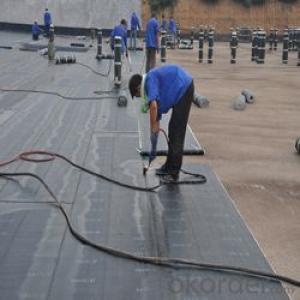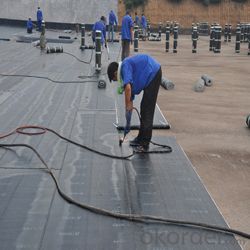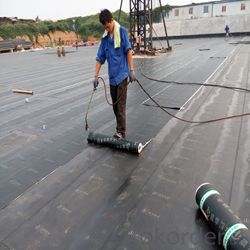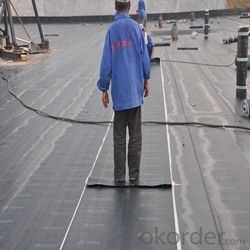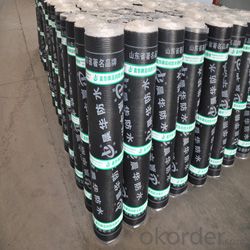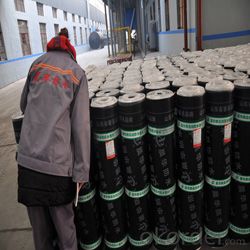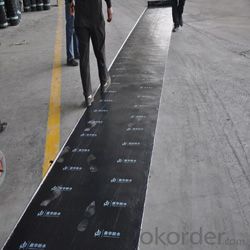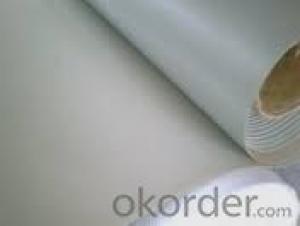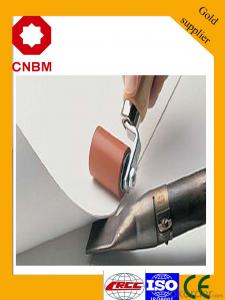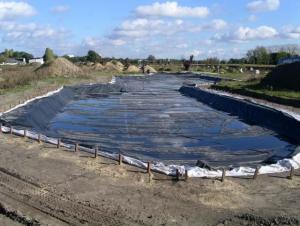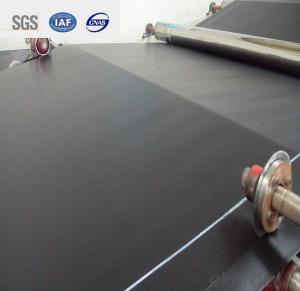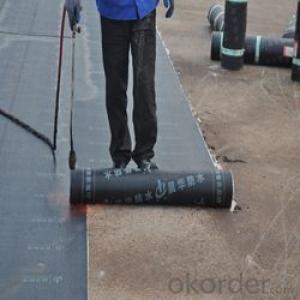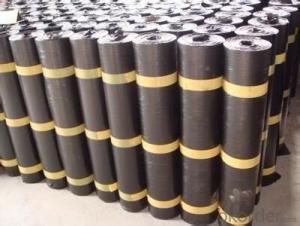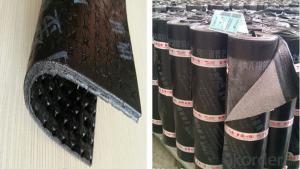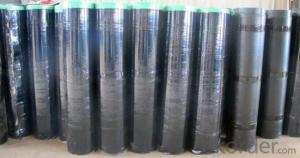SBS bitumen waterproof membrane
- Loading Port:
- Qingdao
- Payment Terms:
- TT OR LC
- Min Order Qty:
- -
- Supply Capability:
- 122000 m²/month
OKorder Service Pledge
OKorder Financial Service
You Might Also Like
Specification:
Width:1m
Length/roll:7.5m/10m/15m or as your need.
Surface:PE film/Granules/Sand etc.
Thickness:3mm\4mm.
Characteristic:
a) SBS modified bitumen waterproof membrane is specially used as waterproof material in cold area
b) APP is specially suitable for areas of high temperature and of strong sun-shine
SBS/APP Modified Bitumen Waterproof Membrane
c)Good performance in good impermeability ,anti-puncture, anti-broker, anti-resistance, anti-erosion, anti-mildew, anti-weathering
d)Possess good tensile strength, elongation rate and size stability which could be well suited the substrate
distortion and crack
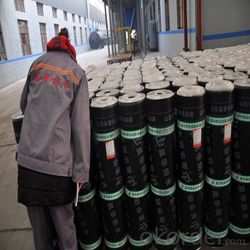
- Q: Can a waterproofing membrane be used for a roof?
- Yes, a waterproofing membrane can be used for a roof. Waterproofing membranes are specifically designed to provide a barrier against water penetration, making them an ideal choice for protecting roofs from leaks and water damage. They are durable, flexible, and can be applied to various types of roofs, including flat and sloped surfaces.
- Q: Can a waterproofing membrane be used for storage tanks or containment areas?
- Yes, a waterproofing membrane can be used for storage tanks or containment areas. Waterproofing membranes are designed to provide a barrier against water or other liquid penetration, making them suitable for applications where containment is required. These membranes are typically made from materials such as rubber, PVC, or bitumen, which are known for their water-resistant properties. They can be applied to the interior or exterior surfaces of storage tanks or containment areas to prevent leaks and protect the structures from moisture damage. Additionally, waterproofing membranes can also help to prevent the growth of mold or mildew, ensuring a safe and hygienic environment for stored materials or liquids.
- Q: Can a waterproofing membrane be used on precast nickel surfaces?
- Yes, a waterproofing membrane can be used on precast nickel surfaces. Waterproofing membranes are designed to create a barrier against moisture and prevent water penetration. They can be applied to various surfaces, including concrete, metal, and even nickel. However, it is important to ensure that the waterproofing membrane is suitable for use on nickel surfaces and is compatible with the specific type of precast nickel being used. It is recommended to consult with a professional waterproofing contractor or the manufacturer of the membrane for guidance on the specific application and to ensure proper adhesion and effectiveness of the membrane on precast nickel surfaces.
- Q: Is a waterproofing membrane resistant to solvents or chemical spills?
- Yes, a waterproofing membrane is typically resistant to solvents or chemical spills. Waterproofing membranes are designed to provide a protective barrier against water and other liquids, including solvents and chemicals. These membranes are often made of materials such as PVC, TPO, or EPDM, which have excellent resistance to various solvents and chemicals. However, the specific resistance may vary depending on the type and composition of the membrane. It is always recommended to check the manufacturer's specifications and consult with professionals to ensure the membrane's compatibility with specific solvents or chemicals before installation.
- Q: Does a waterproofing membrane require any maintenance or regular inspections?
- Indeed, the maintenance and regular inspection of a waterproofing membrane are necessary. Although these membranes are built to be robust and have a prolonged lifespan, they are still susceptible to the effects of wear and tear and potential harm. Consistent inspections are crucial in order to detect any indications of damage or deterioration promptly, allowing for swift action to prevent further complications. Maintenance tasks may comprise the cleaning of the membrane to eliminate dirt or debris, mending any visible cracks or tears, and guaranteeing appropriate drainage and water flow. Furthermore, it is advisable to adhere to the manufacturer's maintenance guidelines and arrange professional inspections periodically to ensure the waterproofing membrane's efficacy and longevity.
- Q: Can a waterproofing membrane be used for a swimming pool liner?
- Yes, a waterproofing membrane can be used for a swimming pool liner. In fact, it is a common and effective solution for creating a watertight seal in swimming pools. Waterproofing membranes are designed to be durable and resistant to water penetration, making them an ideal choice for lining pools. They provide a protective barrier that prevents water from seeping into the ground, which can cause structural damage and leaks. Additionally, waterproofing membranes can be customized to fit any pool size and shape, ensuring a perfect fit and maximum waterproofing performance. Overall, using a waterproofing membrane as a swimming pool liner is a reliable and cost-effective solution to maintain the integrity and longevity of the pool structure.
- Q: Can waterproofing membranes be used on concrete surfaces?
- Concrete surfaces can indeed benefit from the use of waterproofing membranes. These membranes are specifically designed to create a barrier against water penetration. They are often employed on concrete surfaces to safeguard them against water damage. Typically, these membranes are composed of rubber, PVC, or bitumen and can be applied to the concrete surface either in a liquid or sheet form. Once applied, the membrane forms a strong and continuous waterproof layer that effectively prevents water from seeping into the concrete. This proves to be particularly advantageous in areas that frequently come into contact with water, such as basements, bathrooms, or outdoor concrete structures. By preventing water-related issues such as cracking, spalling, or mold growth, waterproofing membranes effectively prolong the lifespan of concrete surfaces.
- Q: Can a waterproofing membrane be used on plaster surfaces?
- Yes, a waterproofing membrane can be used on plaster surfaces. Plaster is a porous material that can easily absorb water, making it susceptible to damage from moisture. Applying a waterproofing membrane on plaster surfaces helps to create a barrier that prevents water from penetrating the plaster, thus protecting it from moisture-related issues such as mold, mildew, and deterioration. It is important to ensure that the plaster surface is clean, dry, and free from any loose or flaking material before applying the waterproofing membrane. Additionally, proper surface preparation and application techniques should be followed to ensure the effectiveness and longevity of the waterproofing system.
- Q: Can waterproofing membranes be used on concrete reservoirs?
- Yes, waterproofing membranes can be used on concrete reservoirs. These membranes provide a protective barrier against water infiltration, ensuring that the reservoir remains watertight and preventing any potential leaks or damage to the concrete structure. Waterproofing membranes are commonly used in construction to enhance the durability and longevity of concrete reservoirs.
- Q: Can a waterproofing membrane be certified or approved by industry organizations?
- Yes, a waterproofing membrane can be certified or approved by industry organizations. There are various industry organizations and standards bodies that evaluate and certify building materials and products, including waterproofing membranes. These certifications or approvals ensure that the membrane meets specific quality and performance standards set by the industry. Industry organizations such as the International Organization for Standardization (ISO), Underwriters Laboratories (UL), and the American Society for Testing and Materials (ASTM) often provide certifications or approvals for waterproofing membranes. These certifications involve rigorous testing and evaluation of the membrane's physical properties, such as its ability to resist water penetration, durability, and compatibility with other building materials. Certifications or approvals from industry organizations provide assurance to consumers, architects, contractors, and building owners that the waterproofing membrane has undergone testing and meets recognized standards for quality and performance. They also help in building code compliance and may be required for certain projects. It is always advisable to look for waterproofing membranes that have been certified or approved by reputable industry organizations to ensure that you are using a reliable and effective product for your waterproofing needs.
Send your message to us
SBS bitumen waterproof membrane
- Loading Port:
- Qingdao
- Payment Terms:
- TT OR LC
- Min Order Qty:
- -
- Supply Capability:
- 122000 m²/month
OKorder Service Pledge
OKorder Financial Service
Similar products
Hot products
Hot Searches
Related keywords
